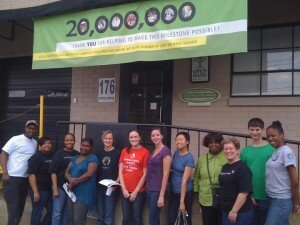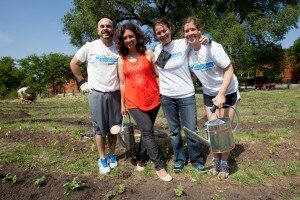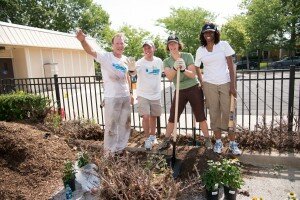 Today’s guest post comes from Michael LaRue, a Teen Volunteer Leader with HandsOn Suburban Chicago.
Today’s guest post comes from Michael LaRue, a Teen Volunteer Leader with HandsOn Suburban Chicago.
1) Let us know our boundaries: When you put teens in charge of something make sure you let them know their boundaries in the leadership. There have been many volunteer activities that I have participated in where I had no idea what I was suppose to do when it came to leadership. Whether it be overstepping my boundaries and giving instructions that the teen should not be giving. Or just standing there not knowing where to start because there have been people doing the jobs you thought were directed towards you.
2) Impact is most important to us! When thanking a Teen Volunteer know that most of us know we are doing a good job. If we weren’t happy with the progress or success of a program we wouldn’t be doing it. Therefore, if you’re going to thank us know that the only thanks we truly need is seeing the smile on the leader’s face or the smile of the people we’re serving (in my case the students I mentor).
3) Treat us with respect. Know that we are here to volunteer because we have passion for what we are volunteering for, As a teen leader I know that I don’t have full control and I would never expect that, what I do expect though is to be treated with respect for I am giving up time to help something that is important to me.
4) Don’t treat us like we are kids. We may not be adults, but we do have an idea of what is going on. Tell us what we need to do and allow us to ask for change in order to improve what needs to be done.
5) Don’t expect more out of teen volunteers than you expect out of yourself. We are a team; therefore we should be working together for a common goal, not separately.
Michael LaRue has been volunteering since he was a freshman in high school in his hometown of Arlington Heights, Illinois. In four short years, he’s worked with Riley Elementary School Homework Club tutoring students and helping them with homework. Through Buffalo Grove High School’s Interact Club, he’s helped to lead his peers in impacting their community in various ways. Most recently, he’s become a Teen Volunteer Leader with HandsOn Suburban Chicago, taking a key leadership role in the CHiL program, where he leads and supports 20 volunteers who work with middle school students to improve their grades through homework help as well by acting as role-models and mentors.
HandsOn Suburban Chicago is a partner and grantee of generationOn, Points of Light’s global youth service enterprise. Through a dynamic partnership called Ready-Set-Go!, generationOn and HandsOn Suburban Chicago have almost doubled the amount of direct service and leadership opportunities available to youth in northwest suburban Chicago. To learn more about Ready-Set-Go! and to access our free resources to train adults to be more effective managers of youth volunteers, click here.


 Today’s blog post was written by Luci Miller, an AmeriCorps National Direct member at
Today’s blog post was written by Luci Miller, an AmeriCorps National Direct member at  in with my parents in Atlanta, Georgia.
in with my parents in Atlanta, Georgia. At the end of my term, I was able to put my skills into action, while planning the Points of Light staff volunteer project at the Atlanta Tool Bank. I engaged over 25 volunteers successfully. It was amazing to see the skills I have been developing all year come to life!
At the end of my term, I was able to put my skills into action, while planning the Points of Light staff volunteer project at the Atlanta Tool Bank. I engaged over 25 volunteers successfully. It was amazing to see the skills I have been developing all year come to life!







 Volunteers give so much to the causes they serve. It’s no surprise that volunteers are also benefiting from their time spent in service! As you give your time and skills, you will find new people, skills, connections, and perspectives. Read on for a few rewards and opportunities that come to those who reach out in service.
Volunteers give so much to the causes they serve. It’s no surprise that volunteers are also benefiting from their time spent in service! As you give your time and skills, you will find new people, skills, connections, and perspectives. Read on for a few rewards and opportunities that come to those who reach out in service. Volunteering helps you develop great friendships. It takes an extraordinary person to love a stranger enough to give your time and skills to them. Some volunteers find that the quality of people they met while volunteering is higher than anywhere else; there is something intrinsically special about people who volunteer.
Volunteering helps you develop great friendships. It takes an extraordinary person to love a stranger enough to give your time and skills to them. Some volunteers find that the quality of people they met while volunteering is higher than anywhere else; there is something intrinsically special about people who volunteer.

 There is nothing like summer vacation as a teenager! With summer comes endless possibilities. It can be a chance to laze around and catch up on all of that terrible TV you missed during the school year, or it can be a learning and growing experience in your own community. Leave the couch behind and spend time volunteering this summer. Volunteering can help you learn new skills, understand more about your professional interests, and give you something to put on your resume for college applications and future paid positions!
There is nothing like summer vacation as a teenager! With summer comes endless possibilities. It can be a chance to laze around and catch up on all of that terrible TV you missed during the school year, or it can be a learning and growing experience in your own community. Leave the couch behind and spend time volunteering this summer. Volunteering can help you learn new skills, understand more about your professional interests, and give you something to put on your resume for college applications and future paid positions! Libraries If you’re a big reader or just looking for a cool place to escape the summer sun, volunteering at your local library might be right for you. Library volunteers work in a variety of positions including the computer center, re-shelving books, and aiding with the children’s programs. Ask to speak to someone in volunteer services at your local library.
Libraries If you’re a big reader or just looking for a cool place to escape the summer sun, volunteering at your local library might be right for you. Library volunteers work in a variety of positions including the computer center, re-shelving books, and aiding with the children’s programs. Ask to speak to someone in volunteer services at your local library. outdoors doing community service while bonding with your friends & family. You and your dad ca plant seeds, turn compost, and dig in the dirt. Remember to bring all your banana peels, apple cores, any rotting lettuce you forgot was in the refrigerator, tops of carrots or peppers that you cut from your dinner preparations, and coffee grounds from your breakfast to also help feed the compost system.
outdoors doing community service while bonding with your friends & family. You and your dad ca plant seeds, turn compost, and dig in the dirt. Remember to bring all your banana peels, apple cores, any rotting lettuce you forgot was in the refrigerator, tops of carrots or peppers that you cut from your dinner preparations, and coffee grounds from your breakfast to also help feed the compost system. Celebrate all the fathers in your community by delivering donuts! That’s right, donuts are the ultimate comfort food and a pleasant way to say thank you to all the dads in your neighborhood. I’m pretty sure they’ll love this simple treat this father’s day.
Celebrate all the fathers in your community by delivering donuts! That’s right, donuts are the ultimate comfort food and a pleasant way to say thank you to all the dads in your neighborhood. I’m pretty sure they’ll love this simple treat this father’s day.
